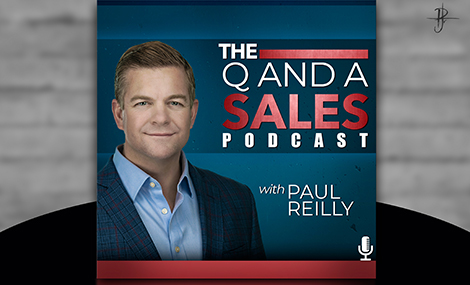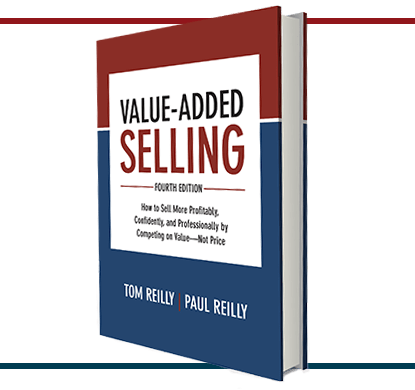In this episode, Paul shares five common mistakes that salespeople make.
Show Notes:
Failing to plan and prepare is the most common mistake. Failing to plan is the height of arrogance or just pure laziness. Ninety-five percent of top-achievers plan every call.
Never accept a no from someone who cannot say yes. You must get in front of the right decision-maker.
Following-up with a customer demonstrates your professionalism.
Where is your focus on the sales call? Are you focusing on the customer or yourself? Empathy gives you the ability to view the world through the eye of the customer.
Most salespeople don’t understand their company’s value proposition. That’s why many sellers can’t compellingly communicate their value.
Click here to purchase the latest copy of Value-Added Selling!
Thanks to our editing team at The Creative Impostor Studios. Click here to book a complimentary consultation with Andrea to find out how they can partner with you in creating your own podcast. Tell them Paul sent you.
***
Our show is updated weekly with the questions you ask. So, please go to the home page, subscribe, share it with your friends, but most importantly, ask the question that you want answered.
Thank you for tuning in. Make it a big day.
What are common mistakes salespeople make?
(Transcribed from podcast)
Today’s question came from a recent conversation I had with a group of sales managers. We were talking about their sales team, and one of the sales leaders asked about some of the common mistakes that salespeople will make. So that’s what we’re going to talk about in today’s show. Again, the question is: What are the top mistakes salespeople make?
Now, before we get into that question, let’s first give a shout-out to our sponsor, Andrea and The Creative Impostor Studios. You’ve heard me say it several times, if you’re thinking of starting a podcast, if you have any questions about it, you don’t need to do this all on your own. You can find some help, and Andrea and her team do an absolute wonderful job. They’ve helped grow this podcast ever since the very beginning. It’s now been downloaded in over 50 different countries. This past month was an absolute record month for number of downloads. So, if you’re wanting to connect with your audience, reach out to Andrea and her team.
Also, pick up your latest edition of Value-Added Selling available on Amazon or wherever you get your books. Again, this is a great investment. I think it’s running for like $27, $28 on Amazon right now. That is a small investment to help your sales career. So invest in that, keep it handy, refer to it often and make it your go-to guide to go out there and sell.
Let’s get into that question. What are some of the top mistakes that salespeople will make? These are in no particular order, so I’ll just start off with number one: failing to plan and prepare. This is something you’ve heard me say on previous episodes. We analyze top-achieving salespeople, and one thing we found about them is they plan and they prepare. In fact, our research shows 95 percent of top-achieving salespeople, they routinely plan every single sales call. Not only that, but they’re fanatic about preparing for it. They’re going to role-play with themselves. They’re going to practice their pitch. That’s what top achievers do. And one thing I often see are salespeople who just want to wing it. They think, “I’m so good that I just don’t need to prepare,” or, they think, “It’s just a routine call. I don’t need to prepare.” If you don’t prepare, it’s really either the height of arrogance, or you’re just lazy. You think you’re so great that you don’t have to do it, or you’re just too lazy to do it. Either way, you’ve got to plan. You’ve got to prepare.
Early on in my sales career, I was shadowing a salesperson, and for the life of me, I don’t know why I was shadowing this salesperson. My sales manager hooked me up with him and said, “Hey. Go out there just to observe.” What I was witnessing was a playbook on what not to do as a salesperson. The guy never planned a sales call. In fact, his most common line when we would walk in to visit with a prospect or a customer was “You don’t need anything today do ya?” That’s what the guy would say. As soon as he walks in and he’s like begging them, “Please don’t buy anything from me. I don’t want to sell you anything either.” This guy wouldn’t plan and he wouldn’t prepare. It was pathetic. That’s the first mistake. Again, salespeople will fail to plan and they will fail to prepare.
The second thing I see, and this is another very common mistake, salespeople will fail to get in front of the ultimate decision maker. And this is common. I’m sure you’ve experienced this in your industry, where you’re not talking to the right person, or there’s someone else you should be talking to. Yet, salespeople continue to go down that path where they are talking to people who will talk to them versus the person who will actually make the decision. I’ve heard every reason why salespeople do this: Maybe they’re afraid of ticking off a lower-level contact, or maybe they just can’t seem to get that meeting, or they don’t know who to contact. Whatever it is, remember that those are just excuses. You have to get in front of the right person. You have to get in front of that ultimate decision maker. That’s the second biggest mistake.
The third thing I see is lack of follow-up, salespeople that will have a great meeting, then they just fail to follow up with the customer in a timely fashion. They promised to send them information, yet, they don’t send that information. Or, maybe they follow up once or twice and then call it quits and think, “Okay. Maybe they’re not ready to buy. Maybe now is not a good time. I’ll wait till later.” But that lack of follow up, remember, that speaks to your professionalism.
Professional salespeople follow up. They follow up to a T. When they promise information, they give that information. When they promise they’re going to follow up, they reach out and follow up with the customer. And when you’re following up with the customer, remember that, more than anything, you have to create value in each interaction. Each time that you follow up with the customer, your message has to create some sort of value for the other person—for the person receiving that message. So, poor follow up skills. That’s another mistake that I see with salespeople.
One thing I notice, and this is another top mistake salespeople make, especially during tough times, they will focus more on themselves versus the customer. They focus more on their need to sell versus their need to solve the customer’s problem. And when we think about this, this means we’re becoming seller focused. Seller-focused thinking is about viewing the world through your own eye, and it’s attempting to define value for the customer versus really understanding how that customer defines value.
This will take shape in many forms. I often see it with salespeople who go in and explain just how great their company is, how awesome they are, how many awards they’ve won. And I get wanting to position yourself as the front runner and all that good stuff. You’ve got to remember, your value added that you bring to the table, that you present to your customers, it has to align with what that customer actually cares about. It has to align with a problem that they’re experiencing, that you can potentially help solve. And so, in Value-Added Selling, we teach salespeople to put themselves in the position of the customer, to view the world through their eyes, so they can understand value at a much deeper level; from that customer’s perspective. And that’s just basic empathy when you think about it. As a salesperson, to avoid this, put yourself in the position of the person you’re going to meet with. Imagine what it’s like to be them. Imagine what their day-to-day is like and how you could potentially help them. That’s one way to get around that seller-focused type of thinking.
Another thing, salespeople will fail to communicate their company’s value in a compelling way. We’ve seen this in a few studies. One of the recent studies, we asked salespeople if they really understand their company’s value proposition. Less than half the salespeople really agree. Well, if you don’t know your company’s value added, how are you going to communicate it in a compelling way? There’s an easy way to do this. I think we’ve mentioned this from previous shows, but every time you think of your value-added extras (your companies, your products, you as the salesperson), when you think about your value added extras, you have to ask yourself this question, “How does this value added impact the customer? What do they stand to gain? What’s in it for them? Why would they even care about this particular value-added extra?” That’s where we can take a message, and we can tweak it, and make it a little more compelling is just by answering that question: How does this impact the customer?
So, five mistakes to avoid as a salesperson: Number one, you’ve got to plan. Number two, you’ve got to talk to all the right people. Number three, you’ve got to follow up impeccably. That’s just being a professional salesperson. Number four, you’ve got to focus on the customer, not focus on yourself. And then finally, you’ve got to communicate your message of value in a compelling way. That means explaining how it impacts the customer.
Make it a big day.


